

A Toulouse, on efface vos pires souvenirs - High tech / Sciences. Un médicament qui agit sur vos souvenirs traumatisants pour les rendre acceptables, ça ressemble à de la fiction.
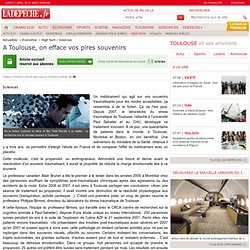
Ça ne l'est plus. Depuis 2007, le laboratoire du stress traumatique de Toulouse, rattaché à l'université Paul Sabatier et au CHU, développe ce traitement innovant. À ce jour, une quarantaine de patients dans le monde, à Toulouse, Montréal et Boston, en ont bénéficié. Une subvention du ministère de la Santé, obtenue il y a trois ans, va permettre d'élargir l'étude en France et de comparer l'effet du médicament avec un placebo. Cette molécule, c'est le propanolol, un antimigraineux.
If you want to be an expert, what little thing is almost as important as 10,000 hours of practice. How can you deal with angry people without losing your cool. 5 things you didn’t know about being a better person: Pourquoi rions-nous ? Training our brains to see ourselves in a more attractive light. Researchers at the Department of Developmental and Educational Psychology have designed a programme called Mírate bien (Take a good look at yourself).
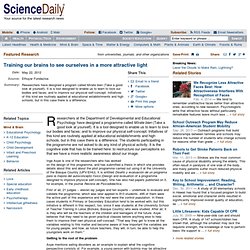
It is a tool designed to enable us to learn to love our bodies and faces; and to improve our physical self-concept. Initiatives of this kind are routinely applied at educational establishments and high schools, but in this case there is a difference. The students participating in the programme are not asked to do any kind of physical activity. It is the cognitive side that has to be trained here: to restructure our perceptions so that we have a more realistic awareness about our image. Inge Axpe is one of the researchers who has worked on the design of this programme, and has submitted a thesis in which she provides details about this and about the pilot programme carried out using it at the University of the Basque Country (UPV/EHU).
Getting to the root of the problem. Can you really predict what will make you happy? Are you only as young as you feel. 5 things you didn't know about body language. A recent study suggests that death anxiety prompts more people to believe in intelligent design and reject evolution. - Science - Apr 3, 2011 - Interesting Facts and Fun Facts. Female tears affect a man’s sexual drive! - Science - Jun 25, 2012 - Interesting Facts and Fun Facts.
A scientist in Israel, Shani Gelstein, began collecting women’s emotional tears in vials.

Gelstein wanted to know why people cry at emotional moments and believes them to be a chemical signal. In a couple different tests, she looked at how female tears affect males. She had men smell saline drops and tears and watched how their brain reacted. The parts of the brain that deal with sexual desire notably dropped after sniffing the female tears. Men had no reaction after smelling the saline, though. There’s a test that can tell you if you unconsciously have negative bias towards a race or group of people! - Facts - Mar 21, 2012. What percentage of marriages survive infidelity? What percentage survive cancer. Evidence builds that meditation strengthens the brain.
Earlier evidence out of UCLA suggested that meditating for years thickens the brain (in a good way) and strengthens the connections between brain cells.

Now a further report by UCLA researchers suggests yet another benefit. Eileen Luders, an assistant professor at the UCLA Laboratory of Neuro Imaging, and colleagues, have found that long-term meditators have larger amounts of gyrification ("folding" of the cortex, which may allow the brain to process information faster) than people who do not meditate. Further, a direct correlation was found between the amount of gyrification and the number of meditation years, possibly providing further proof of the brain's neuroplasticity, or ability to adapt to environmental changes.
The article appears in the online edition of the journal Frontiers in Human Neuroscience. The cerebral cortex is the outermost layer of neural tissue. Is it the big things or little things in life that most determine out happiness? - Barking up the wrong tree. If I replaced your girlfriend with someone else, would you even notice? - Barking up the wrong tree. How can you stop worrying about projects at work. Noise and music are more distracting to introverts at work. Many workplaces allow the playing of radio or recorded music during working hours, providing a chance to personalise and brighten the working climate.
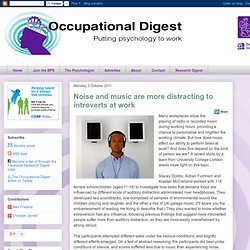
But how does music affect our ability to perform tasks at work? And does this depend on the kind of person we are? A recent study by a team from University College London sheds more light on this topic. Stacey Dobbs, Adrian Furnham and Alastair McClelland worked with 118 female schoolchildren (aged 11-18) to investigate how tasks that demand focus are influenced by different kinds of auditory distraction administered over headphones.
They developed two soundtracks, one composed of samples of environmental sound like children playing and laughter, and the other a mix of UK garage music. The participants attempted different tasks under the various conditions, and slightly different effects emerged. Can touching improve team performance? - Barking up the wrong tree. Quand l'enfant acquiert « la théorie de l'esprit » - Jean-François Dortier, article Psychologie. La « théorie de l'esprit », soit la capacité à comprendre les intentions d'autrui, apparaît bien plus tôt chez l'enfant qu'on le pensait jusqu'alors.

Une expérience récente semble le prouver et relance un débat vieux de trente ans. Face à un petit garçon, âgé de 15 mois, assis sur un tapis, une jeune femme manipule un jouet : une tranche de pastèque en plastique. Elle enferme le jouet dans l'une des deux boîtes, verte ou jaune, posées devant elle, puis s'absente. Quelques minutes plus tard, la voilà qui revient prendre le jouet dans la boîte verte, là où elle l'a placé. Rien de plus normal dans tout cela. Mais changeons un peu le scénario. How not to spot personality test fakers. Personality tests are an effective recruitment tool: higher scorers on conscientiousness and lower scorers on neuroticism tend to perform better in the job.
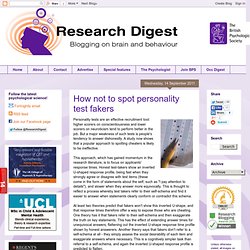
But a major weakness of such tests is people's tendency to answer dishonestly. A study now shows that a popular approach to spotting cheaters is likely to be ineffective. This approach, which has gained momentum in the research literature, is to focus on applicants' response times. Honest test-takers show an inverted U-shaped response profile, being fast when they strongly agree or disagree with test items (these come in the form of statements about the self, such as "I pay attention to details"), and slower when they answer more equivocally.
What methods are most effective in reducing anxiety? - Barking up the wrong tree. How can you quickly and easily strengthen your ability to remember something? - Barking up the wrong tree. How losing can increase your chances of winning. When is losing the route to winning?
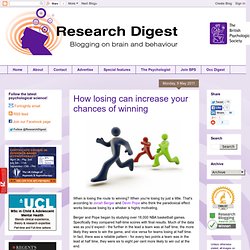
When you're losing by just a little. That's according to Jonah Berger and Devin Pope who think the paradoxical effect works because losing by a whisker is highly motivating. Berger and Pope began by studying over 18,000 NBA basketball games. Specifically they compared half-time scores with final results. Much of the data was as you'd expect - the further in the lead a team was at half time, the more likely they were to win the game, and vice versa for teams losing at half time.
What simple thing can help you communicate better, learn more and even enhance problem solving. Homme ou femme ? Jetons un œil ! Une image vue par peu de photorécepteurs peut être mal analysée par le cerveau. © Laitr Keiows, Wikimedia, CC by-sa 3.0.

[en anglais] Les riches sont réellement différents, et pas dans un sens positif - Liens complémentaires. Can you improve your mood just by smiling? - Barking up the wrong tree.
Violence. Coopération. Clown-doctors Could Help Dementia Sufferers. Plants Have a Social Life. After decades of seeing plants as passive recipients of fate, scientists have found them capable of behaviors once thought unique to animals.

Some plants even appear to be social, favoring family while pushing strangers from the neighborhood. Research into plant sociality is still young, with many questions unanswered. But it may change how people conceive of the floral world, and provide new ways of raising productivity on Earth’s maxed-out farmlands. “When I was in school, researchers assumed that some plants were better or worse than others at getting resources, but they were blind to the whole social situation,” said Susan Dudley, a McMaster University biologist. “I went looking for it, and to my shock, found it.